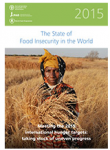UN agencies released their joint annual report on food insecurity, showing that total numbers of people living in hunger declined in 2015, but that chronic hunger persisted in areas suffering “protracted crises” caused by conflict and disasters.
This year's report focuses on 'Meeting the 2015 international hunger targets: taking stock of uneven progress.'
 27 May 2015: Three UN agencies released their joint annual report on food insecurity, showing that total numbers of people living in hunger declined in 2015, but that chronic hunger persisted in areas suffering “protracted crises” caused by conflict and disasters. This year’s report focuses on ‘Meeting the 2015 international hunger targets: taking stock of uneven progress.’
27 May 2015: Three UN agencies released their joint annual report on food insecurity, showing that total numbers of people living in hunger declined in 2015, but that chronic hunger persisted in areas suffering “protracted crises” caused by conflict and disasters. This year’s report focuses on ‘Meeting the 2015 international hunger targets: taking stock of uneven progress.’
The Food and Agriculture Organization of the UN (FAO), the International Fund for Agricultural Development (IFAD) and the World Food Programme (WFP) collaborated on ‘The State of Food Insecurity in the World 2015,’ which discusses: economic growth and progress towards food security and nutrition targets; the contribution of family farming and smallholder agriculture to food security and nutrition; international trade and food security linkages; the relevance of social protection; and the impacts of protracted crises.
The report finds that total numbers of people living in hunger declined to 795 million, 100 million fewer than in 2012, and 216 million fewer than in 1990. It shows that 72 out of the 129 countries monitored by the FAO have achieved the Millennium Development Goal (MDG) target of halving the prevalence of undernourishment by 2015 – a number reflecting “near-achievement” of the MDG, according to FAO Director-General José Graziano da Silva.
However, the 2015 SOFI also highlights wide differences among regions, noting that several countries failing to reach the targets have suffered from natural and human-induced disasters or political instability, and some countries have achieved economic growth without benefiting their poor, reflecting the lack of effective social protection and income redistribution policies. The authors call for action undertaken at the global and regional levels to take into account the exposure of countries to natural and human-induced disasters, especially in small island developing States (SIDS).
On smallholder agriculture, the authors highlight that smallholder farmers have increased land and labor productivity by adopting sustainable farming practices, and currently grow 70% of the world’s food. [Publication: The State of Food Insecurity in the World 2015] [UN Press Release] [World Agroforestry Centre Article]